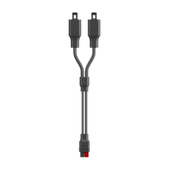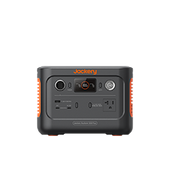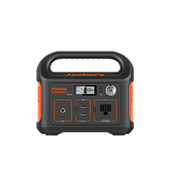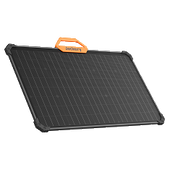The power in BTUs per hour (BTU/hr) is equal to 3.412142 times the power in watts (W). For wattage to BTU conversion, you can use the following formula:
BTU Per Hour = Watts × 3.412142
If the wattage value is 120W, the BTU per hour will be equal to 409.45704 BTU/h. BTU is the unit that measures energy or heat.
BTU is defined as the amount of heat needed to raise the temperature of 1 pound of water by 1°F. The wattage is the unit of power.
Jackery Portable Power Stations feature highly efficient LiFePO4 or NMC batteries with high capacities. They can charge most household or outdoor appliances, such as air conditioners, televisions, refrigerators, sump pumps, etc., for long hours. This will help you reduce your reliance on the electricity grid and lower monthly electricity bills. These power stations are portable and lightweight, so you can carry them anywhere you like.
Key Takeaways
- BTU (British Thermal Unit) is the measurement of heat or energy. It represents the amount of heat needed to raise the temperature of 1 pound of water by 1°F.
- The watt is the unit of power used to measure the power consumption of appliances and calculate energy consumption. A watt unit is equal to one joule per second.
- British Thermal Unit (BTU) per hour is equal to wattage multiplied by 3.412142. For example, 50W is equal to 170.6071 BTU/h.
- One watt is equal to BTU/h multiplied by 0.29307107. For instance, 100 BTU/h is equal to 29.307107W.
What Is Watt? What Is BTU?
Watts measure the rate at which energy is transferred, whereas BTUs (British Thermal Units) are specifically an energy unit. Watts and BTUs are units of measurement used in relation to the heat output of the electrical appliances. Let's explain these units briefly:
Wattage
Watts are units of power that represent an energy transfer of one joule per second. They also represent the power consumption of an appliance when it runs for a certain period. One watt also equals the power generation in the circuit with one volt of voltage potential and a current of one ampere.
Watt's Law determines the relationship between amps, volts, and watts. With the help of Watt's Law, you can easily calculate power in watts by multiplying current and voltage. The power in watts equals current in amperes times the potential difference in voltage: P (W) = I (A) × V (V).
BTU
BTUs stand for British Thermal Unit and equal the amount of energy needed to raise one pound of liquid water by 1°F. They are sometimes used to measure the heat output of central heating systems. BTU per hour can be represented as BTU/h.
Watts Vs. BTU
Converting watts to BTUs or vice versa isn't simple. While BTUs are a unit of energy, watts measure the rate at which energy is transferred. If you want to convert BTUs into watts, you'll need to specifically talk about converting BTUs per hour into watts. For example, if you know the BTU/h that's required to heat the room, it will only take a simple calculation to convert them into the preferred measurement.
Wattage to BTU Conversion
Converting wattage to BTU is not possible since these are not directly related. However, it is possible to convert wattage to BTU per hour or vice versa. Ideally, one watt is equal to 3.412142 BTU per hour. The conversion is mainly used in different fields, such as appliances, power plants, and heating and cooling systems.
Mathematically, wattage to BTU per hour conversion can be represented as follows:
BTU Per Hour = Watts × 3.412142
The power in BTU per hour is equal to the power in wattage multiplied by 3.412142.
Here's the wattage to BTU per hour conversion scale:

Let's take an example to understand better:
If you want to convert 10 watts to BTU per hour, consider substituting the values in the above formula.
BTU Per Hour = 10W × 3.412142 = 34.12142 BTU/h
When the wattage is increased from 10W to 100W, the BTU/h will be 100W × 3.412142 = 341.2142 BTU/h.
Here's a table showing different watt measurements converted to BTU/h:
|
Wattage |
BTU Per Hour |
|
1W |
3.4121 BTU/h |
|
2W |
6.8243 BTU/h |
|
5W |
17.06 BTU/h |
|
10W |
34.12 BTU/h |
|
20W |
68.24 BTU/h |
|
50W |
170.605 BTU/h |
|
100W |
341.21 BTU/h |
|
1000W |
3412.1 BTU/h |
|
10000W |
34121 BTU/h |
BTU to Wattage Conversion
BTUs (British Thermal Units) and watts are two different energy measurement units. A BTU is a measurement unit of heat energy commonly used in the United States, particularly in cooling and heating systems. It determines the amount of energy that's needed to raise the temperature of 1 pound of water by 1°F.
On the other hand, a wattage is the power unit that measures the rate of energy transfer or conversion. Converting BTUs to watts is not directly possible as they measure different things. However, it can be done in specific conditions. For instance, if you have the number of BTUs per hour handy, you can convert BTU/h to watts by multiplying with the conversion factor of 0.29307107.
Here's a formula to convert BTU to watts:
Watts = BTU/h × 0.29307107
Where W is the power in wattage
BTU/h is the energy in British Thermal Units per hour
You can calculate the watts by multiplying the energy in BTU/h by the conversion factor 0.29307107.

Let's say you want to convert 10 BTU/h to wattage using the above formula.
Watts = 10 BTU/h × 0.29307107 = 2.9307107W.
Here's a table showing various BTU to wattage conversions:
|
BTU Per Hour |
Wattage |
|
1 BTU/hr |
0.293071W |
|
2 BTU/hr |
0.586142W |
|
5 BTU/hr |
1.4654W |
|
10 BTU/hr |
2.9307W |
|
20 BTU/hr |
5.8614W |
|
50 BTU/hr |
14.65355W |
|
100 BTU/hr |
29.3071W |
|
1000 BTU/hr |
293.071W |
|
10000 BTU/hr |
2930.71W |
Measurements of Power
If you're wondering why the electricity bills are high or making home upgrades, you'll need to understand different electrical power units. Here, we will list standard electrical units:
Watts: A watt is the rate at which energy is transferred and is defined as 1 joule per second. There are many multiples of watts, such as kilowatts (= 1000 watts) and terawatts (= 1 trillion watts). Many common household appliances, such as refrigerators, microwave ovens, light bulbs, and televisions, are measured in watts. On the other hand, a lightning strike is 1 terawatt of power and lasts for a few microseconds.
Watt-hours: A watt-hour equals the energy of one watt supplied to or taken from an electric current for one hour. One kilowatt-hour is one kilowatt consumed or generated for one hour. For example, if a light bulb uses 50 watts per hour of electricity and is run for 5 hours, it will use a total of 250Wh of electrical energy.
Ohm: The ohm is the unit of electrical resistance. It is defined as the amount of electrical resistance between two places when there is a potential difference of 1 volt between these points. The potential difference creates a current of 1 amp in the conductor. You'll typically see this unit on speakers.
Decibel-watt: A decibel-watt measures the electrical signal strength and is abbreviated dBW. You may find dBW on a radio, microwave, or fiber optic items.
Volt: Voltage determines the flow of electricity between two points. Generally, regular batteries have 1 or 1 ½ volts. For example, electric sockets in North America are 120V, whereas the third line on the electric train track is 600 - 750 volts.
Ampere-hour: The amp-hour is the unit of an electrical charge. It measures the electrical current over one hour and is abbreviated as mAh. It is typically used for calculating some batteries, X-rays, and electroplating systems.
Kilowatt-hours: A kilowatt-hour is the amount of energy used in one hour. Your monthly electricity bills reveal how many kWh of power your home uses during the billing cycle. A household uses 5 to 50kWh of electricity per day, depending on the size of the house, season, and other factors.
kWh is also used to measure the capacity of a portable power station or solar generator. Jackery Portable Power Stations come in different sizes and have higher capacities (high kWh values). You can charge various household or outdoor appliances for long hours to ensure you can deal with extended power outages, camping, blackouts, overlanding, RV trips, etc.
Jackery Portable Power Stations Explained
Jackery is a reputable brand that manufactures high-quality solar generators, solar panels, and portable power stations. The Jackery Portable Power Stations feature safe and reliable LiFePO4 or NMC batteries and can charge most household or outdoor appliances for extended periods. They can be recharged with the Jackery SolarSaga Solar Panels, which are made with monocrystalline silicon solar cells.
They have an ergonomic design, sturdy handles, and powerful batteries to carry the portable power stations to outdoor locations and charge appliances. They operate by emitting less than 30dB of noise, which means you can use them indoors without worrying about noise or toxic emissions. Here are three Jackery Portable Power Stations that are ideal for various scenarios:
Jackery Explorer 3000 Pro Portable Power Station
The Jackery Explorer 3000 Pro Portable Power Station is a reliable and compact charging solution that powers 99% of household or outdoor appliances for hours. Its large capacity and longer battery life allow it to charge appliances during extended power outages, blackouts, overlanding, RV trips, or other outdoor adventures. The fully upgraded BMS technology features 12 forms of protection, a security chip, and improved heat dissipation efficiency to improve overall safety.
Appliances Running Time
- Ice Maker (500W) = 5.1H
- Microwave (1000W) = 2.5H
- Refrigerator (800W) = 3.2H
- Portable AC (1000W) = 2.5H
- Coffee Maker (600W) = 4.2H

Customer Review
"My wife and I have used our 240W's to charge our cell phones and other things like my electric razor. After this last 19-hour power outage, we decided to add 3000W Pros to handle our upright freezer and fridge so that we could protect our cold food storage, too." — Brian Law.
Jackery Explorer 2000 Plus Portable Power Station
The Jackery Explorer 2000 Plus Portable Power Station has a versatile and expandable capacity to meet various power needs. It supports an additional Jackery Battery Pack 2000 Plus to extend the battery capacity from 2kWh to 24kWh. What's more, the Jackery Explorer 2000 Plus Portable Power Station has an ultra-long standby mode that can hold a 50% charge for up to 2 years. The 20ms emergency power supply ensures that essential household appliances like CPAP machines or refrigerators remain powered in the blink of an eye if there's a power outage.
Appliances Running Time
- Ice Maker (500W) = 3.4H
- Microwave (1000W) = 1.7H
- Refrigerator (800W) = 2.1H
- Portable AC (1000W) = 1.7H
- Coffee Maker (600W) = 2.8H

Customer Review
"I purchased this to give my husband and me peace of mind during what has become more frequent power outages in our home. My husband uses an oxygen concentrator at night. The unit quickly charged up, and testing has shown it will power the concentrator for 7.1 hours, which will get him through the night in an emergency." — Judy Browne.
Jackery Explorer 1000 v2 Portable Power Station
The Jackery Explorer 1000 v2 Portable Power Station is a faster, stronger, and smaller charging solution ideal for indoor and outdoor use. It features multiple output ports to charge phones, laptops, and other household appliances simultaneously. It also has a compact foldable handle and suitcase-style design to power mainstream appliances during camping, glamping, RVing, or other outdoor adventures. When charging the appliances, it emits only 30dB of noise (less than a whisper) to ensure zero disturbance.
Appliances Running Time
- Ice Maker (500W) = 1.8H
- Microwave (1000W) = 54 minutes
- Refrigerator (800W) = 1.1H
- Portable AC (1000W) = 54 minutes
- Coffee Maker (600W) = 1.5H

Customer Review
"I bought my very first Jackery battery power station as a small home backup since we have had multiple power outages lately. It is a nice unit that works flawlessly with an easy-to-use display panel." — Steven G.
Wattage to BTU Conversion FAQs
How big of a portable power station do I need?
The exact size of a portable power station you need for your home or outdoor adventures will depend on the total wattage of the charged appliances and for how long. Here's an example to understand better:
Let's say you are charging a refrigerator (400W), TV (100W), and portable fan (50W) with the help of Jackery Explorer 2000 Plus Portable Power Station. The working hours can be calculated using the following formula:
Working Hours = 2042.8Wh × 0.85 ÷ 550W = 3.1H
Note: We have multiplied by 0.85 because there will be some power loss when charging the appliances.
How do you convert 1500 watts to BTU?
If you want to convert 1500 watts to BTU/h, you'll need to multiply wattage by 3.412142.
BTU Per Hour = 1500W × 3.412142 = 5,118.213 BTU/h
How many BTUs is a 60-watt bulb?
A standard 60-watt bulb produces nearly 60W of heat per unit of time, which can be converted to BTU/h by multiplying by 3.412142. Thus, a 60W bulb produces 204.72852 BTUs per hour.
BTU Per Hour = 60W × 3.412142 = 204.72852 BTU/h
How many watts does it take to run a 5000 BTU?
1 BTU is equal to 0.29307107 watts. To convert 5000 BTU to wattage, multiply the BTU/h by 0.29307107.
Wattage = 5000 BTU × 0.29307107 = 1,465.35535 watts or 1.465 kilowatts per hour
How to calculate BTU for power supply?
If you want to calculate British thermal units (BTU) per hour (BTU/h) for a power supply, divide its wattage by its efficiency and multiply the result by 3.41214.
For example, if a server has an 850W power supply with 91% efficiency at 100% load, the BTU/h calculation would be 850W ÷ 0.91 = 934W.
You can convert wattage to BTU/h by multiplying the obtained value by 3.41214.
BTU Per Hour = 934W × 3.41214 = 3187 BTU/h
Wattage to BTU Conversion
For wattage to BTU conversion, you need to multiply watts by 3.412142. If you have BTU/h, you can multiply the BTU/h by 0.29307107 to get the wattage. While watts and BTUs are units of energy, they measure two different ways of how energy is transferred. Jackery Portable Power Stations have high kWh or Wh values, meaning they can charge most household or outdoor appliances for hours. They are compact, lightweight, and powerful charging solutions that power appliances and reduce high electricity bills.












































































































![How to Convert Watts to BTU [Wattage to BTU Conversion]](http://www.jackery.com/cdn/shop/articles/wattage_to_btu_conversion.jpg?v=1718765954)







Leave a comment